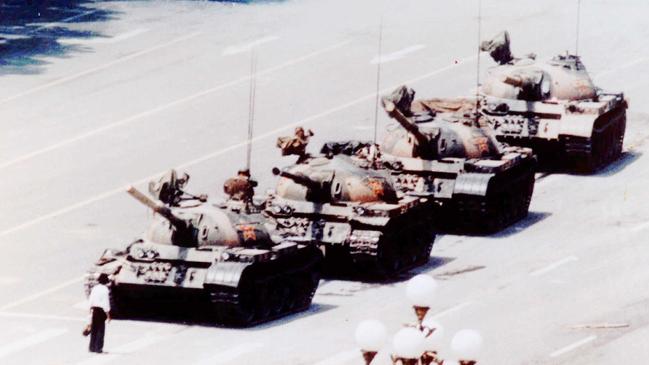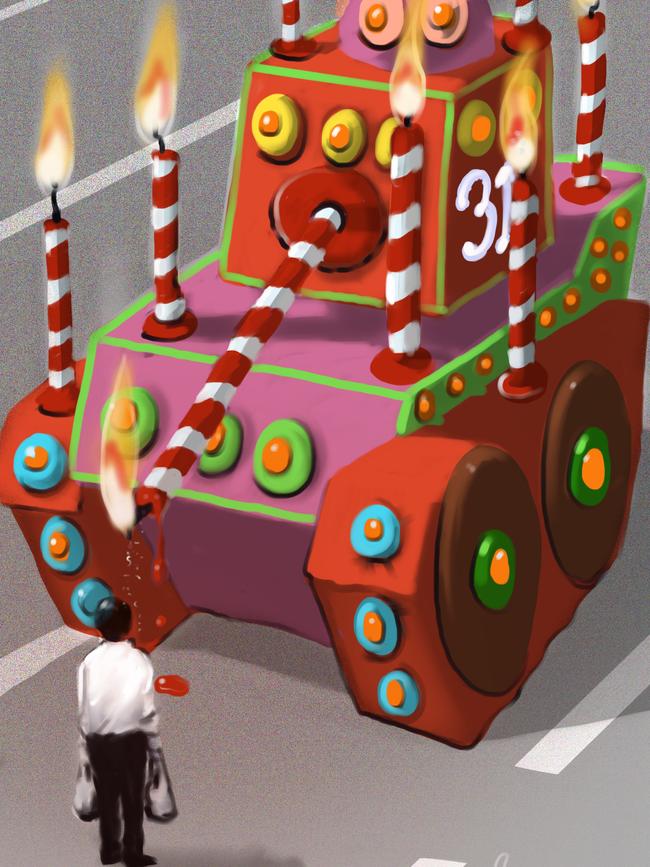
There are several reasons why we should refuse to forget it.
That was the date on which the hardline authoritarians in China defeated the last of the more liberal-minded senior political figures. That defeat has had fateful consequences. They are writ large in the extreme authoritarianism and personality cult of Xi Jinping. Deng Xiaoping had been refusing to embrace serious reforms for a decade by then, starting with his suppression of the Democracy Wall in 1979. But the violence in 1989 was a watershed event.
The Orwellian surveillance and repression we see in China under Xi are the antithesis of what the young students in Tiananmen Square were calling for in early 1989: a more open, accountable, human-rights respecting, “democratic” government.
In the immediate wake of the bloodshed perpetrated by the so-called People’s Liberation Army, angry young people wrote up on their university dorms or classroom walls — before the secret police shut down dissent, arrested thousands and wiped out traces of the protests — slogans such as “Thunder from the silent zone!”, “China is dead!”, “Where is justice?”, “The government caused the turmoil!” and “The truth will out some day!” The party persists even now in denying that truth brazenly.
We can see the dire consequences of this denial and suppression in the totalitarian measures taken under Xi in Xinjiang; the turmoil in Hong Kong triggered by the CCP’s blatant subversion of the Basic Law, and corruption of the Hong Kong police; and the increasingly bellicose threats to “smash” the democratic regime in Taiwan if it doesn’t come to heel on Beijing’s terms.
We have seen it, also, in the ominous manner in which the CCP responded to the outbreak of the COVID-19 virus in Wuhan: arresting and imprisoning journalists and medical personnel who set off alarm bells; asserting a monopoly of information that fatefully delayed global alerts about the viral outbreak; and now seeking to coerce our own and other governments around the world into accepting its propaganda, rather than calling for an independent inquiry into the genesis of the pandemic.
All too many Western figures took the party’s corner on the matter of Tiananmen. Their defence of its actions varied from blatant claims, such as that by former (1974-82) German chancellor Helmut Schmidt, that the party and its military arms had been “provoked” by the students; to the “pragmatic” line taken by US President George HW Bush, or my old friend William Overholt, that the incident was tragic, but a disintegration of the regime had been the alternative and we all needed to be patient with the party. It would reform and open in due course, provided we persisted in “constructive engagement” and helped China to participate in the liberal international order.

We collectively did that, and the consequences are plain for all to see. China was admitted into the World Trade Organisation and embraced in the councils of the Western and developed world. Investment was poured into it. Concessions were made to it on every front. Markets were opened to it. It was allowed to keep its state-owned industries, its state-owned banks, its state-dominated stock exchange, its CCP-dominated judiciary, its lack of press freedom, while enjoying all the benefits of trade and diplomatic deference. The outcome has been Xi and the CCP’s bid to undermine the liberal world order and extend the global influence of the party’s unregenerate authority.
All this is reason enough to recall the Tiananmen Square massacre with dismay and a more cautious strategic policy regarding China as the road not taken. But there is more to the picture than misgivings about the CCP’s domestic hyper-authoritarianism, geopolitical ambitions and relentless subversion of the Pax Americana. As Hong Kong-based scholar Jiwei Ci argues, in Democracy in China: The Coming Crisis (Harvard, 2019), the party is headed for a massive and destabilising legitimation crisis. Why? Because Chinese society has become “democratic” (educated and sophisticated), while the CCP has become fearfully authoritarian.
We could end up with the worst of all possible worlds: the breakdown of order and economic growth in China; the failure of that great country to fulfil its possibilities as a trusted and admired modern state alongside the rest of us; and open conflict. The great hope of the 1980s — and the basis for holding our peace after June 4, 1989, and clinging to hope for responsible political reform and opening for 30 years — was the fulfilment of China’s economic and political possibilities.
Tiananmen sent China down the wrong political path. We failed to push for a correction. The likes of Hu Yaobang and Zhao Ziyang before that date inspired rational hope for a whole new relationship with a post-Mao China. That hope was crushed that day, but far too many of us clung to it anyway. Economic pragmatism trumped political principle and geopolitical caution. We have profited from trading with the mercantilist Leninist leviathan state. Now both we and it are facing a great reckoning.
Paul Monk (paulmonk.com.au) is a former head of the China desk in the Defence Intelligence Organisation. He is the author of Thunder from the Silent Zone: Rethinking China (2005) and Dictators and Dangerous Ideas (2018).



On this day in 1989, the Chinese military brutally crushed unarmed crowds of Chinese students who had, since April that year, been calling for political reforms and greater civil liberties. Ever since, the Chinese Communist Party has tried to airbrush the incident out of history and to discourage mention of it even in foreign media.